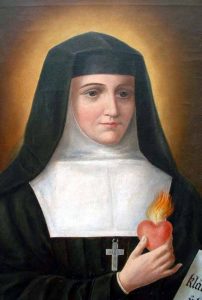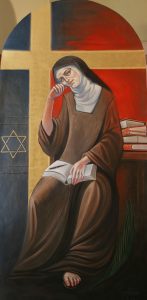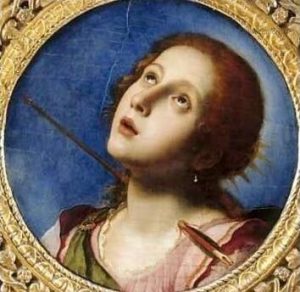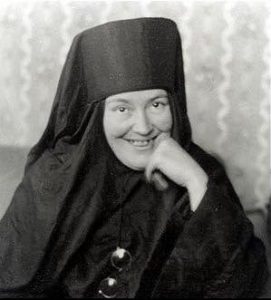 In the Orthodox Church there is a person most people don’t know, at least those who are Latin Catholics, St. Maria of Paris, the “Saint of the Open Door.” I find her story captivating and desirable to know and follow. Her feast is today, but she is also liturgically recalled on March 31.
In the Orthodox Church there is a person most people don’t know, at least those who are Latin Catholics, St. Maria of Paris, the “Saint of the Open Door.” I find her story captivating and desirable to know and follow. Her feast is today, but she is also liturgically recalled on March 31.
She is also known as St. Maria Skobtsova who died in Ravensbrück prison in 1945; the Orthodox Church venerates Mother Maria as a martyr. The Synod of the Ecumenical Patriarchate raised her to the altar.
Here is a sermon preached in honor of St. Maria of Paris by Teva Regule earlier this week.
Glory to the Father, and to the Son, and to the Holy Spirit, one God. Amen.
“Come, take the Light that is never overtaken by night!”
This invitation is given to us every year at the Paschal midnight service when the Light of Christ is brought out from the altar area that represents His tomb, and is spread among the people. As we read on that First Sunday of Pascha in the Gospel according to John, it is the Light of Christ that illumines all and shines in the darkness, but is not overcome by it (Jn. 1:5). Throughout the year, we continue to proclaim the power of this Light when we sing (or recite) one of the most ancient hymns of the church at every Vespers service—Phos Hilaron or, in English, “O Gladsome Light”. Our life of faith relies on this Light and the revelation that makes us believers. Jesus says, “While you have the light, believe in the light, so that you may become children of the light” (Jn. 12:36). By our baptism, we become children of this Light (e.g. Baptismal Rite, p. 148). In today’s Gospel reading, Jesus tells his disciples that they are [to be] the lights [of Christ] in the world. He encourages them to let their light shine before others so that all may see their good works and, as a result, glorify God. As Christians, we are called to shine forth the Light of Christ in our own lives, illuminating the whole world with the love and compassion of our Lord.
The Church gives us models to help guide us in this endeavor—the saints. They are human beings, recognized by the Church as witnesses to the Light of Christ in the world. This week, on July 20, we remember a modern saint—St. Maria of Paris (and those canonized with her)—to whom I would now like to draw our attention. (Feel free to reference the handout with some of her icons as well as the troparion and kontakion that we sing in her memory.)
We know little of the actual life of many of the saints of the Church. In most cases we rely on hagiographic forms that can often be reduced to caricatures. But with Mother (now Saint) Maria Skobtsova we have an embodied personality (some might say, an all-too-human personality)—an intellectual, a divorced woman, a political revolutionary, and towards the latter part of her life, a nun. She was a woman who could be frank, outspoken, strong willed and even sometimes, quarrelsome. She was a monastic who defied conventional norms, among other things, smoking in public! One might imagine her sitting in a café in Harvard or Central Square, drinking coffee and smoking cigarettes, covered in black monastic garb. While this may not be so out of place for Cambridge, it certainly would be by traditional standards of monastic decorum. In fact, she often criticized “classical” monasticism as well as all that she perceived as deficient or dead in Christianity. She was someone who was shaped by the events of the 20th century—two world wars, forced emigration from her Russian homeland, and abject poverty—and who would subsequently lead a life of prayer, but one in the world, dedicated to helping others. Her code of practice was based on the recognition of the dignity of all people created in the ‘image and likeness’ of God. We are all called to venerate the image of God in our neighbor. For her, it was essential to put oneself in their place. This understanding of what is means to love God and neighbor would form the basis for her life.
Mother Maria was born in 1891. As a child of the landed gentry, she had a university education and became part of the cultural elite of St. Petersburg. She counted among her friends and acquaintances well-known writers, poets, and political thinkers of the time. They would spend hours discussing politics, economics, and theology. As a result of these interactions, her interest in theology deepened and she became the first woman to take courses at the (famous) Ecclesiastical Academy at the Alexander Nevsky Monastery.
Forced to emigrate from her homeland amid revolution and war, she (as did many other Russians) made her way to Paris. It was here that her life would radically change. Like many recent immigrants, she lived in poverty. Although she was to continue to write and discuss and debate social issues and theology, her life after the war was spent in action. Her work with the Russian Student Christian Movement put her into contact with many of the impoverished outcasts of the Russian emigration. It was from this contact that she lived out her theology. Her model was the early monastics of the Church.
But would monasticism be a framework for her life? She was convinced that a new type of monasticism was necessary for the emigration, with a concern for the world as its focus. For her, the ethical imperative of the liturgy demanded that it be carried into the world. She called it the “liturgy beyond church bounds” (Pearl of Great Price, p. 42). Her base of operations was the House at Rue de Lourmel. It was here that she provided a fixed address for those needing to qualify for governmental assistance; cooked and served dinners to the many hungry, being mindful not to just give out charity but to empower them as much as possible; and provided counseling to those in need. (Some of her ministry is depicted in the various scenes on the icon on the inside cover of your handout.) All were worthy of her efforts. Each was her “neighbor.” During the occupation of France, her philanthropy extended to the many Jews in need of assistance. In addition to helping to feed those needing food, she was also an active member of the resistance movement, smuggling Jews to safe locations and in some cases, facilitating the falsification of baptismal certificates. It was these activities that would lead to her eventual arrest and her banishment to the Ravensbrück concentration camp.
Ironically, in many ways, her life in the camp was no different from her life outside the camp. She still led prayer services, discussed theology, gathered food for others, attended to their other physical needs as well as provided spiritual and emotional support. She devoted her life to the other. Eventually, she laid down her life totally for the other, consciously stepping into the crowd of those selected for “extermination” at the camp, thus taking the place of someone else. She was taken to the gas chamber on 31 March 1945 on the eve of Pascha and as WWII was ending in Europe. (This scene is referenced in the next icon of your handout.) She, along with what have been called other “outstanding personalities of the spiritual history of the Russian emigration in France,” (Act of Canonization ) was canonized by the Ecumenical Patriarchate some fourteen years ago, on 16 January 2004.
Mother Maria was an example of someone who conquered the darkness of hate in a world torn by war and rife with despair by letting the Light of Christ shine through her life and works. She was not only all-too-human, but fully human, living her life in obedience to God and for the other. As depicted along the border of this same icon, she once declared, “Our neighbor’s cross is the sword that pierces our soul….to co-participate, co-feel, co-suffer. [This is] love” (Essential Writings, p. 71). The kontakion dedicated to her (on the back cover of your handout) affirms that St. Maria “became an instrument of divine love… a bright star shining in the darkness” (Kontakion).
May Mother Maria be an example for us, wherever we are, to answer our calling to serve God and our neighbor in whatever way we can. And may we, too, let the Light of Christ shine forth from our lives and our works so that others may see them and be moved to give glory to our Father in heaven (Mt. 5:16).
Amen.
Troparion (Tone 4):
You became a bride of Christ, O venerable Mother,
And offered your body and soul to Him as a living sacrifice.
You exposed the evil side of humanity’s ways
By allowing the light of the Resurrection to shine forth from you.
We celebrate your memory in love.
O Martyr and Confessor Maria
Pray to Christ our God that He may save our souls.
Kontakion (Tone 6, Plagal of the Second):
You became an instrument of divine love, O holy martyr Maria,
And taught us to love Christ with all our being.
You conquered evil by not submitting yourself
into the hands of the destroyer of souls.
You drank from the cup of suffering.
The Creator accepted your death above any other sacrifice
And crowned you with the laurels of victory with His mighty hand.
Pray fervently that nothing may hinder us from fulfilling God’s will Because you are a bright star shining in darkness!
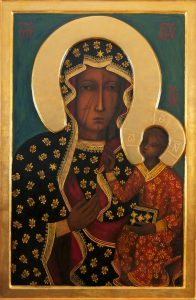 Today is not just another feast of Mary, the Mother of God. No, it is the feast of Our Lady of Czestochowa, Queen of the Slavs, Queen of the World.
Today is not just another feast of Mary, the Mother of God. No, it is the feast of Our Lady of Czestochowa, Queen of the Slavs, Queen of the World.
